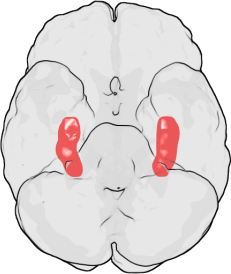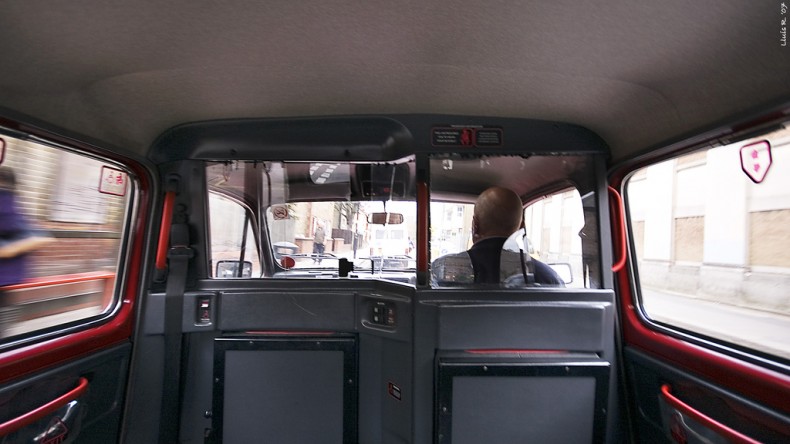This first ran on Nov. 18, 2011, before Sally took indefinite leave. We just know you’re missing her so here’s the next best, the redux Sally.
A transatlantic phone call ended badly the other day. “You can just turn left at the next light,” I heard my friend tell the New York cab driver over a crackly 3500-mile connection from London. After some muffled but dramatic escalation, she was back. “Can I call you back?” she said. “I just got kicked out of a taxi.”
The trouble was that the driver wasn’t familiar with the destination (“even though it’s the middle of Brooklyn!” she yells) and refused her street-by-street directions. “No, no, just get out,” he mumbled, refusing to make eye contact or budge the car.
I had just found out about The Knowledge, so it was hard for me to resist being sanctimonious: this would never happen in London.
The Knowledge refers to the uniquely elaborate training that’s required to get a license to drive a black cab in London.
London’s streets are, plainly speaking, a damned mess. The one-square-mile City of London established by the Romans is connected to all the outer bits that encompass Greater London—which were once separate villages—by a confusing tangle of ancient, incoherent streets. The closest metaphor I can come up with for the street layout here is a plate of spaghetti. Streets curve impossibly, appear randomly, change their names, and occasionally just wink out of existence.
Combine that with the well-documented British disdain for numbering houses, and their artisanal ability to make the world’s tiniest, most illegible street signs, and foreigners pretty much need a sherpa.
Learning to navigate this synaptic tangle takes a London cabbie-in-training two to four years. In this city, you’re never more than a stone’s throw from a guy on a moped with a clipboard: he’s preparing to be tested on his intricate understanding of the 25,000 streets that snake out in a six-mile radius from the central area of Charing Cross. Once they’re confident that they have the information down, it’s time to take the test.
And the test is legendary. One cab driver told me that in the waiting area, the trainees—some of which are decidedly of the rough and tumble variety—all sit there sweating like schoolboys. That’s because it’s brutal. And “it” is actually “they”—months of myriad tests, during which you accumulate a required number of points. Get enough points, and you get your license. How do you get points? You sit across from your Veddy British examiner, no notes and no maps, and he tells you where he’s getting into your car (Springdale Road, say) and where he wants to go (Cantelowes Road). You must now tell him the exact turn-by-turn journey you’ll take to get there. You even have to tell him what side of the street your journey is starting on (wait for the dumb American joke: the wrong one! I’ll be here all week).
Here’s the interesting bit. Learning to negotiate this complicated morass in such stunning detail has a physical effect.
In 2000, University College London neuroscientist Eleanor Maguire looked at fMRI images of the brains of London cab drivers, and found that they had a larger hippocampus than non-taxi drivers.
 The hippocampus is a sea-horse shaped part of the brain crucial to our spatial memory, one on the left side, one on the right. We use it every time we make a mental map of how to get from one place to another. The size of cabbies’ hippocampi was directly related to the length of time they’d been on the job.
The hippocampus is a sea-horse shaped part of the brain crucial to our spatial memory, one on the left side, one on the right. We use it every time we make a mental map of how to get from one place to another. The size of cabbies’ hippocampi was directly related to the length of time they’d been on the job.
Showing that the hippocampus grows in response to extreme use was some of the most dramatic early proof of the plasticity of the human brain, or its ability to rewire itself in accordance with our daily activities. Essentially, “experience can change the brain,” Maguire told Roger Highfield in an interview last year. “In fact, the brain behaves like a muscle: use brain regions and they grow.”
In 2008, a follow-up study from UCL claimed that London cab-drivers have “built-in sat-nav“. But that actually pointed up an interesting new development— London cab drivers do have built-in satnav. But now it’s in their cabs, not in their brains.
When GPS arrived on the scene, it caused a brief flurry of worry over the continued relevance of The Knowledge. That worry sank like a stone, but an interesting consequence of the introduction of GPS may have been the influx of competing unlicensed minicab services that dot every street, advertising their slightly less expensive alternatives to the traditional black cab.
One follow-up I’d like to see to Maguire’s 2000 study is the effect of GPS on the hippocampus. You see, Maguire’s studies showed that the effect of navigating London was transient: that is, after cab drivers retired, the hippocampus shrank down back to normal size with disuse. So if the normal use of the hippocampus caused it to return to its previous size, does the GPS-enabled disuse of the hippocampus cause it to dessicate like a shrunken head?
I haven’t found studies that address whether over-reliance on GPS causes the hippocampus to atrophy, so I hereby choose to volunteer myself as an anecdote. When I first moved to London, I was glued to my Android’s Google map. I don’t think I even saw the streets through which I was walking until about two months in, because I never looked up from my screen. And defying all possibility, my already-crap sense of direction has gotten worse. I get lost without my smartphone, and I freeze in place like a hypnotised turkey.
There have been all kinds of plasticity-based theories of technology’s effects on the brain: that the internet is making us stupid, that social networks destroy our concentration, and most recently that excessively playing video games makes makes our brain’s dopamine-related \ reward centers resemble those of a drug addict.
The ambiguity such studies are always chasing down is: which came first, the size of the brain part, or the consequent behavioural shift? Maguire’s research proved irrefutably that exercising a complex spatial memory leads to a larger hippocampus. So does disuse cause commensurate changes? For example, is my reliance on Google maps turning my brain to mush?
One thing’s for sure: my wizened nubs of hippocampus will ensure that I never get kicked out of a cab for trying to back-seat drive. And I think it’s worth mentioning: not everyone is so enamoured with The Knowledge. When I first flounced into work all pregnant with the knowledge of The Knowledge, one of my colleagues threw a big wet blanket all over my enthusiasm. The phenomenon, he said, has turned into nothing so much as a massive marketing mythology. “You always end up having to give them directions,” he groused. “Especially late at night when you’re drunk.” Which, let’s face it, in London is every night.
Image credits:
Black Cab: Lluís Ribes i Portillo
Hippocampus: Wikimedia Commons
Shrunken Head: Helvetiker at Wikimedia Commons

What would be an equally interesting question to research is the effect of having to remember every furshlugginer street in London had on the stress level of the city’s cab drivers. That is, is there a direct correlation between hippocampus shrinkage and blood pressure decline among GPS using London cabbies? And further to that, do the city’s drunken cab passengers now presume that they will stop drinking at precisely the point they wouldn’t be able to read a Google Map to guide a not-so- knowledgeable cabbie to their destination?
Good point! One thing I left out, to avoid warbling on forever, was the fact that the instructor doesn’t just test you on the strength of street knowledge. Once in a while, they also throw out a perfectly correct result, and then you don’t get the precious points that you studied to hard for months to accumulate. They then filter out the people who immediately snap into a hot rage. It’s their way of ensuring that the inevitable rude or unreasonable passenger doesn’t end up getting kicked out of the cab or worse. That aspect of it galled me the most.
I suspect this street knowledge is different than that perpetrated by NWA, particularly in its strength.
Nice catch. : )
In the 90’s I often had to travel to London for business and had to use cabs frequently. One particular morning my colleague and I got into a cab, the driver started the car and my colleague gave the destination “Shaftesbury Avenue”. The driver turned around and said “Please”. A short and intense dialogue resulted during which the cab driver emphasized the need the say “Please” after giving the destination. We disagreed not because we refused to be civil but because it smacked too much of school and upbringing and “Please” is voluntary and not a necessity after giving instructions to a cab driver. Being from New York, the less you embellish instructions to a New York cab driver, the better the chances to get there fast. The end result was that the driver pulled over-way before Shaftesbury Avenue- opened the door and left no doubt about his intention: for us to get out.
Thanks, Mom! Welcome to LWON comments.
That scene is straight out of a movie. A comedy of manners about rude New Yorkers running afoul of London’s reverse politeness. Technically, I think training to be a taxi driver in London also involves making sure you don’t tell off the passenger. I wish some London cab drivers would weigh in with their experiences. The very few that I have spoken to insist that they keep their cool in the face of the worst acts of rudeness.
There was a time when I was in a cab on the FDR in Manhattan going north from Wall Street. Traffic was heavy and every time the driver stopped the cab he fell asleep! Then traffic would move and I had to shout “Wake the f*** up!” to return him to consciousness. I thought of jumping out but we were in the middle lane. Great relief when that ride was over.
I sent your article to my mom. She wrote back with a story about how when in the mid-80’s, she went to London with her mother-in-law, who had a bum leg from having Polio as a young lady:
“Very interesting. When Grandma Doris and I were in London we took cabs all the time as she didn’t want to take the stairs into the tubes. I remember how incredibly kind and gracious they were to her making sure we were as close to our destination as we could be. When we were going to the Cathedral where Kate and William got married there was something going on, but he did not drop us off at the edge, but somehow wormed his way through all the cars and cabs to get us directly at the gate. I LOVED the black cabs.”